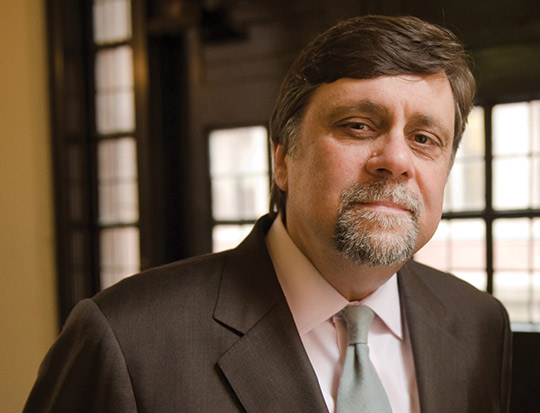Seeding Global Change Q&A: John Allegrante
TC’s new Associate Vice President for International Affairs
John Allegrante, Professor of Health Education and former Deputy Provost, has served as the College’s Fulbright Adviser and Fulbright Scholar Program Campus Representative for the last three years and is the past recipient of two Fulbright scholarships. He is a globally elected board member of the International Union for Health Promotion and Education. He also has served as an international scholar for the Open Society Foundations.
What do you see as your overall mission in your new role?
The history of Teachers College is to be engaged globally and to learn from the rest of the world.
Under the leadership of my predecessor, Tom Corcoran, the College achieved sensational new heights in helping other nations with teacher preparation and professional development, especially in countries such as Jordan, where we’ve worked closely with Columbia University’s Global Centers to implement the Queen Rania Teacher Academy.
My role and, I believe, my mandate, is to extend and build on that track record by catalyzing new efforts in health, psychology and leadership — and specifically to help other countries that wish to build local capacity in these areas, so that their best talent doesn’t end up studying and working elsewhere.
Beyond expanding to those additional domains, how will TC work differently than before?
We need to be strategic and thoughtful not only about what TC faculty are doing globally, but also about how TC as an institution can improve education and education-related work around the world. I would like to see TC be deeply engaged but with more alignment with each of Columbia’s eight Global Centers. Having traveled to several of the Global Centers in my first months in this role, and having conferred with many of the directors of the centers, it’s crystal clear to me that every country in which Columbia has a presence wants to focus on education, especially early childhood education and the development of more and better capacities in higher education. There’s also a growing interest in responding to the need for education among urban populations, particularly those living in poverty. That’s why TC can be such a critical ally in the work of the Columbia Global Centers. So the question for me is: How can we maximize the benefits of education worldwide and what should TC’s role be?
How do we identify the nations that can benefit most from TC’s help?
The relevant stakeholders for us are politically stable, low- and middle-resource countries. We will not limit our work to those countries, but those are the places where we have the greatest opportunity to bring added value and make a lasting impact.
What are TC’s specific priorities for global engagement?
Our major priority should be to help other nations build local capacity by providing them with the technical assistance they need. To that end, I have a number of specific goals for this coming year, all aimed at stimulating more international work by our faculty.
Perhaps most important is the creation of a Global Innovation Fund, modeled on the Provost’s Investment Fund created by Provost James that has seeded so much great work by TC faculty, both in New York City and nationwide. The added twist is that the Global Innovation Fund will provide additional resources to TC faculty members who are working with international partners and the Columbia Global Centers. Our goal is to make four awards this year in order to catalyze some exciting new faculty work.
I have also created a new Faculty Steering Committee for International Affairs, which is being chaired by Professor Lesley Bartlett. The committee is composed of faculty representatives from each of our academic departments, along with several at-large members. The committee convened for its first meeting in late autumn and is already providing me and the administration with superb ideas for how we can organize our work and assist faculty to do the international work they seek to do.
What aspects of your own work are most relevant to your new role?
Over the past several years, I’ve collaborated quite closely with TC Research Professor Inga Dora Sigfusdottir and other scientists at the Icelandic Centre of Social Research and Analysis. Our main focus has been to develop a program of research that has sought to understand both risks and protective factors in healthy child and adolescent development. The next step in our work has been to broaden the intellectual approach and take a life-course view by following a cohort of young people over time in order to see whether there are markers in early life for the kinds of inflammatory processes that occur later in life and cause disease. There is growing evidence that the precursors to heart disease and Alzheimer’s disease begin very early in life, resulting, at least in part, from various nutritional and psychological deprivations. If we can identify biological and other markers for these processes, we can learn more about how best to intervene much earlier to prevent disease.
Published Tuesday, Jun. 3, 2014
